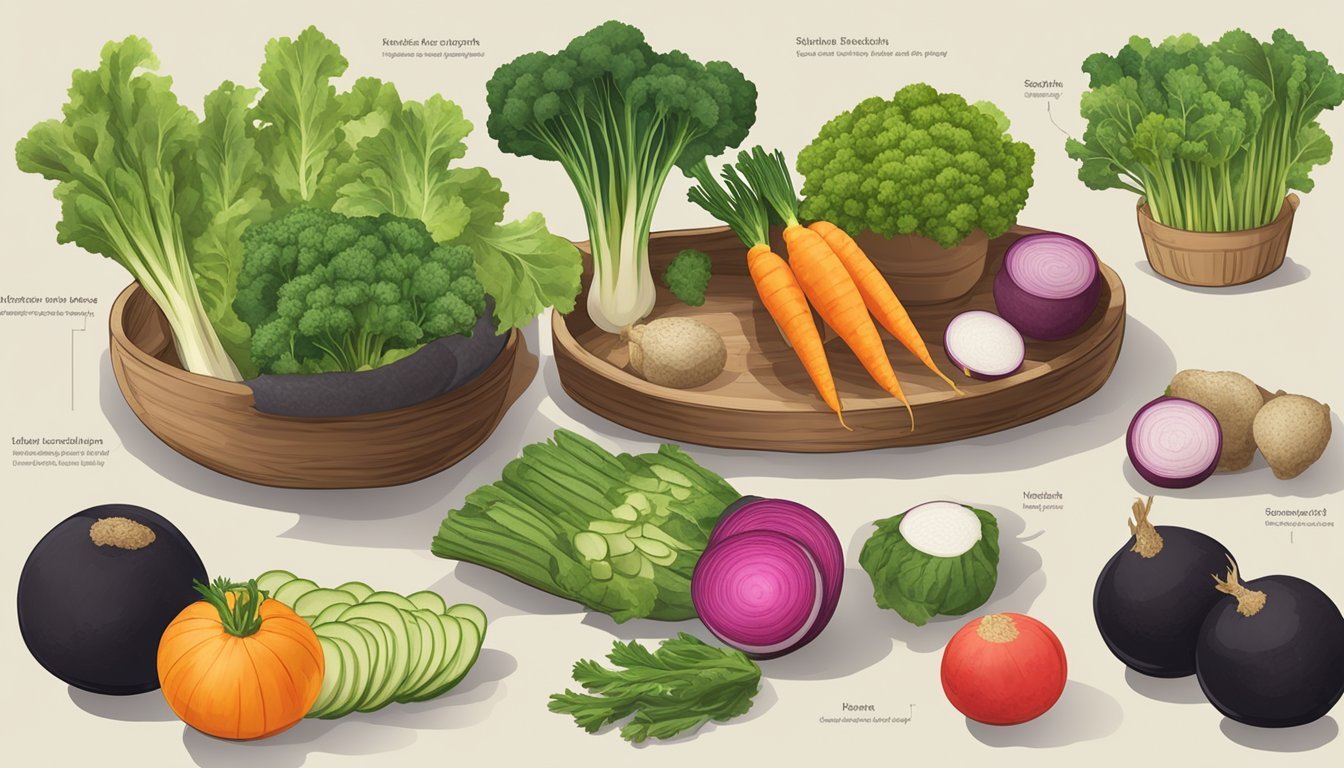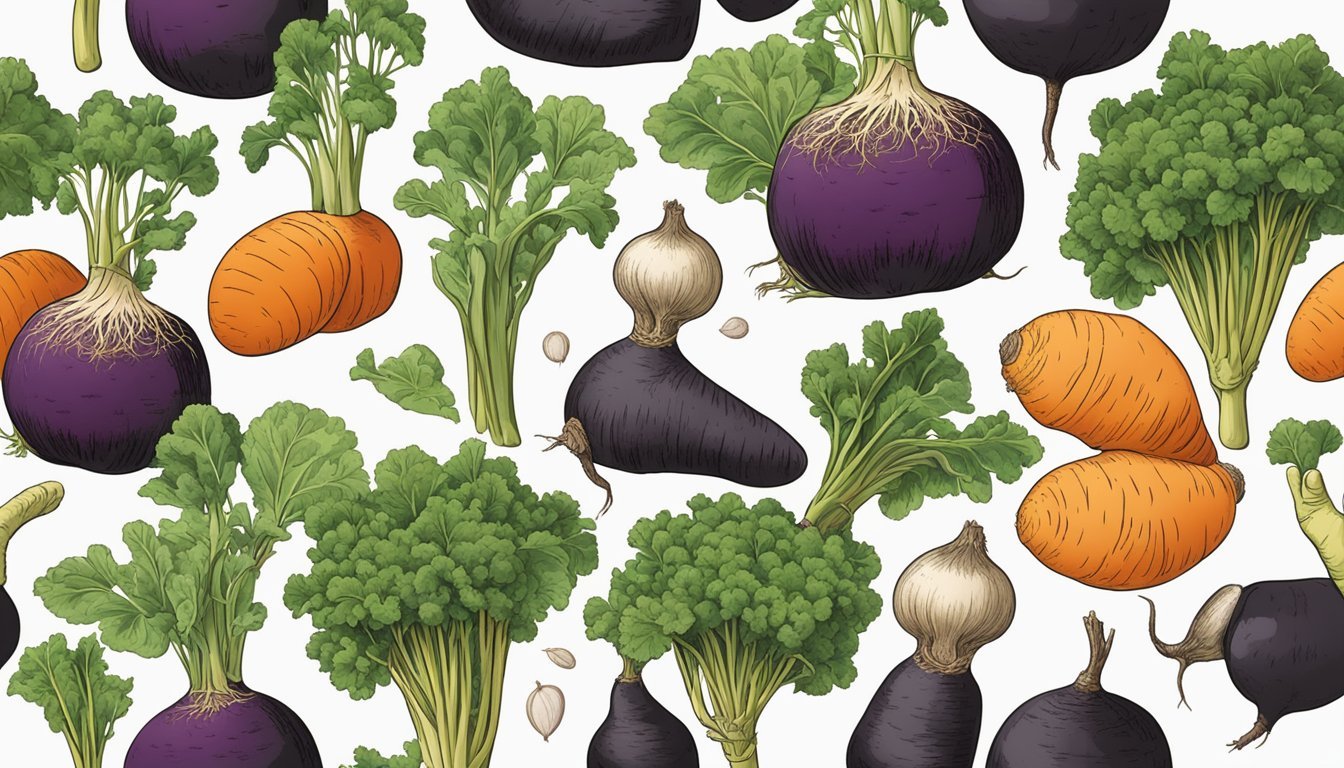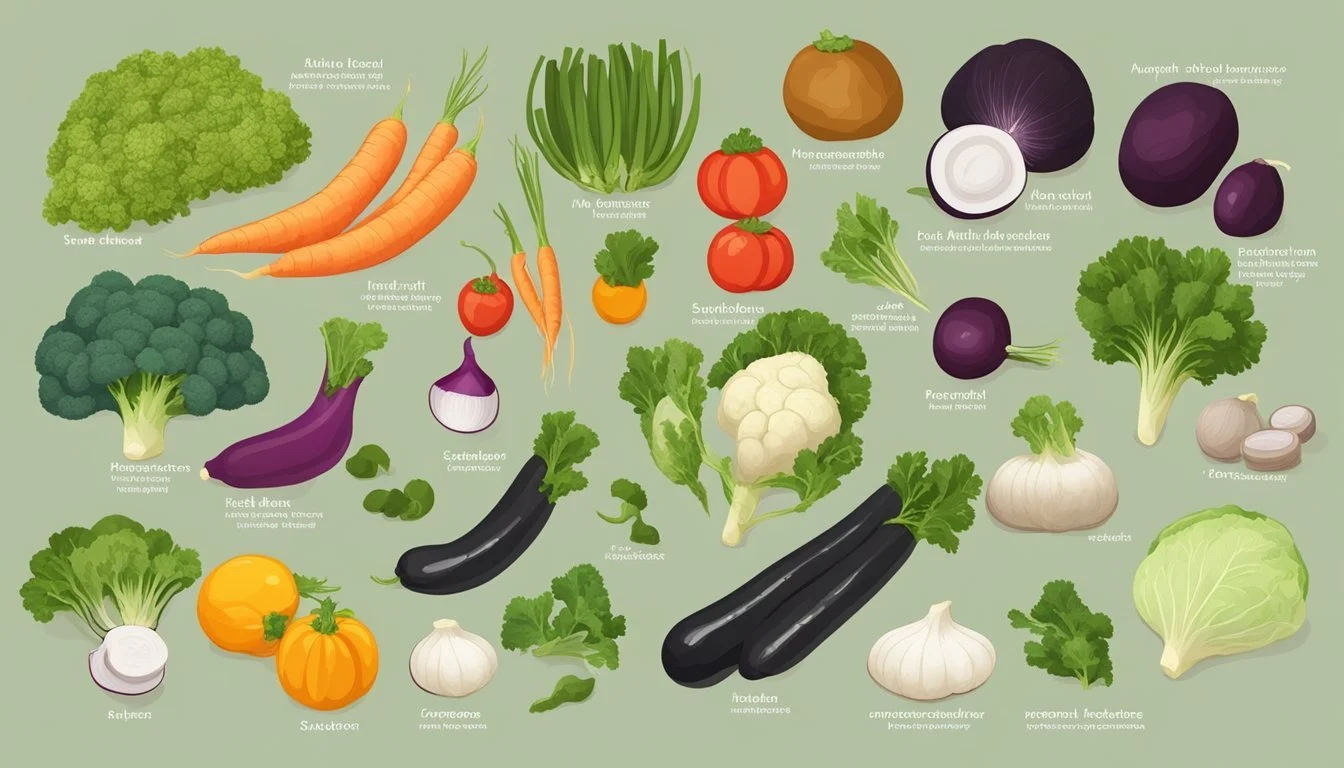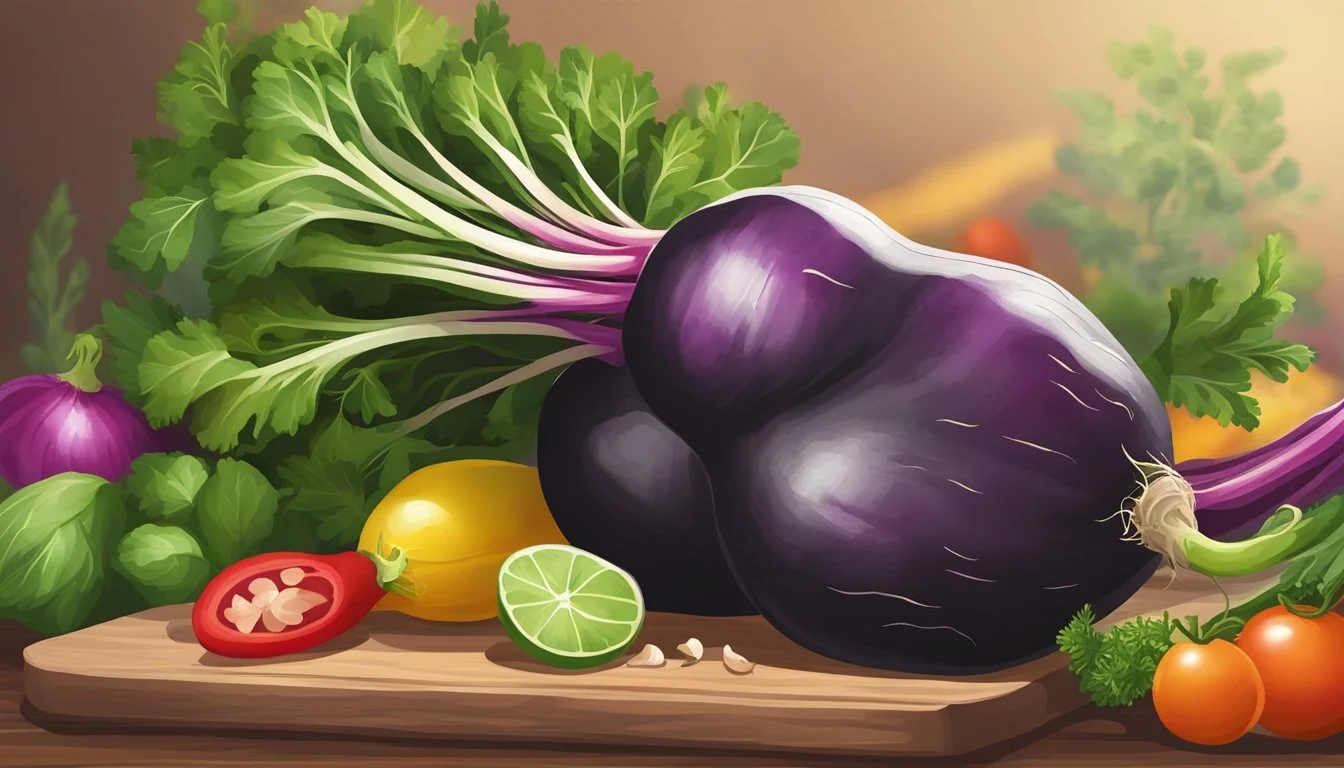Spanish Black Radish Substitutes
Top Alternatives for Your Recipes
When it comes to finding substitutes for Spanish black radish in recipes or diets, there are several viable options. Rutabaga stands out as a particularly effective substitute, replicating the strong, pungent flavor characteristic of the Spanish black radish. This vegetable also mirrors the nutrient profile, offering a good source of dietary fiber, iron, and other essential vitamins and minerals.
In terms of preparation and taste, other radishes like daikon or regular red radishes can serve as acceptable replacements. Daikon, in particular, offers a milder taste that could appeal to those looking for a less intense flavor than that of black radish. These substitutes will still provide health benefits such as improved digestion and antioxidant properties owing to their similar nutritional content.
For those seeking a more adventurous swap, consider using turnips or even horseradish. Turnips offer a slightly different texture but still pack a nutritional punch, while horseradish can match the spiciness and potent flavor of Spanish black radish. These alternatives ensure that you won't miss out on the health benefits typically associated with incorporating radishes into your diet.
Understanding Spanish Black Radish
Spanish black radish offers a unique blend of nutrients and health benefits, making it a valuable addition to various dishes. It is rich in vitamins, minerals, and antioxidants, and can be prepared in diverse culinary ways to enhance meals.
Nutritional Profile
Spanish black radish is packed with essential nutrients. It contains vitamin C, which supports immune function and skin health. This radish is also a good source of dietary fiber, aiding in digestion. Iron, potassium, and magnesium are present in moderate levels, contributing to various bodily functions.
Beyond these, it carries lower quantities of calcium and folate, providing additional health boosts. With only 10 calories per serving, it is a low-calorie option perfect for weight management. Glucosinolates and other antioxidants found in the radish help protect against oxidative stress.
Health Benefits
Consuming Spanish black radish can bring numerous health benefits. The high vitamin C content plays a crucial role in antioxidant protection, reducing the risk of chronic diseases. It also aids in collagen synthesis, promoting healthier skin, muscles, and bones.
Dietary fiber in this radish supports digestive health, helping in regular bowel movements and reducing constipation. The presence of iron is essential for blood production and preventing anemia. Additionally, glucosinolates and other antioxidants may provide anti-inflammatory and potentially cancer-preventative properties.
Culinary Uses
Spanish black radish can be used in various culinary applications. When sliced thinly, it can be added to salads for a crunchy texture. Pickling the radish provides a tangy condiment to complement other dishes. It can also be simmered in soups or stews to release its full flavor.
For a unique twist, try using it in stir-fries or as a garnish for sushi. Its versatility makes it a valuable ingredient in diverse cuisines, adding both flavor and nutrition to meals. The bold taste can elevate simple dishes, making it an exemplary ingredient in the kitchen.
Substitute Options for Spanish Black Radish
When seeking alternatives for Spanish black radish, several root vegetables and cruciferous vegetables offer similar textures and flavors. Each substitute provides unique benefits and can be tailored to specific dishes, enhancing the meal without compromising desired qualities.
Root Vegetables as Alternatives
Daikon: Also known as white radish, daikon provides a mild flavor and a crunchy texture similar to Spanish black radish. Its versatility makes it suitable for salads, soups, and pickling.
Turnips: Turnips can be used in place of black radish, yielding a slightly sweet and peppery flavor. They can be eaten raw or cooked, contributing a firm texture to dishes.
Horseradish: Though spicier, horseradish root presents a robust alternative. Combining it with salt and vinegar mellows the intensity, making it a viable substitute for its pungent flavor.
Other Cruciferous Vegetable Substitutes
Cabbage: While differing in appearance, cabbage offers a crunchy texture and can mimic the peppery bite of black radish in salads and slaws. Consider thinly slicing it to match the texture more closely.
Cauliflower: As a substitute, cauliflower can be grated or chopped finely to replicate black radish's crunch. Its neutral flavor allows it to absorb dressings and spices well, making it flexible in various recipes.
Kohlrabi: Often described as having a taste between a turnip and a radish, kohlrabi brings a sweet, peppery flavor and a crisp texture. It works well in salads, soups, and stir-fries.
Salad-Focused Substitutes
Red Radish: Red radish provides a milder, peppery flavor, making it a straightforward switch for black radish in salads. Its vibrant color adds visual appeal to dishes.
Jicama: Known for its sweet and nutty flavor, jicama offers a similar crunch to black radish. It can be used at a 1:1 ratio in salads, providing a refreshing, slightly sweeter note.
Korean Radish: Korean radish, with its mild flavor and juicy texture, serves as a suitable replacement. It can be sliced thin or julienned to imitate the crunch of black radish effectively.
Selecting the Best Substitute
When looking for substitutes for Spanish black radishes, consider their peppery taste, texture, and nutritional benefits. Explore substitutes that can work well in various recipes such as salads and soups.
Based on Flavor Profiles
Spanish black radishes have a distinct peppery and spicy flavor. To match this, turnips and daikon are excellent choices.
Turnips offer a mildly peppery taste which can mimic the spiciness of Spanish black radishes. Use them raw in salads or cooked in soups for a similar flavor profile.
Horseradish root provides a stronger, more pungent zest, suitable for more savory dishes where a bold kick is needed. It can be grated into slaws or used in marinades.
Daikon is milder but still peppery. It's versatile enough to be used both raw and cooked, making it ideal for various recipes.
Considering Texture and Size
Texture and size play crucial roles in substitution. Spanish black radishes are firm and dense, making them suitable for both raw and cooked dishes.
Kohlrabi is crisp and juicy, closely matching the texture of Spanish black radishes. It is great in raw applications such as salads and slaws, offering a similar crunch.
Jicama also provides a crisp texture but with a slightly sweet and nutty flavor. While its taste isn't as peppery, its crunch is ideal for salads and fresh dishes.
Carrots can be a less spicy but similarly crunchy substitute. They work well in both raw and cooked dishes, providing versatility and ease of use.
Nutrient Equivalents
When substituting Spanish black radishes, it's important to consider the nutritional content they contribute.
Daikon radishes are rich in vitamins C and B6, potassium, and magnesium. These nutrients help support immune function and metabolic health.
Turnips offer a good source of dietary fiber, vitamin C, and calcium, contributing to overall cardiovascular and bone health.
Carrots provide high levels of beta-carotene, vitamin K, and antioxidants. These nutrients support vision, skin health, and immune function.
Substitutes should be chosen not only for their flavor and texture but also for their ability to provide similar health benefits in your dishes.
Health Considerations
Spanish black radish substitutes offer numerous health benefits. Key areas affected include digestive health, liver function and detoxification, and immune system support.
Digestive Health
Spanish black radish substitutes are high in dietary fiber, which is vital for a healthy digestive system. Fiber aids in regulating bowel movements and preventing constipation. It promotes the growth of beneficial gut bacteria, supporting overall gut health.
Benefits:
Dietary Fiber: Helps maintain regular bowel movements.
Gut Bacteria: Supports the growth of beneficial bacteria in the gut.
Anti-Inflammatory Properties: Reduces inflammation in the digestive tract.
Key Compounds: Fiber, antioxidants, glucosinolates.
Liver Function and Detoxification
Compounds found in Spanish black radish substitutes enhance liver function and aid in detoxification. Glucosinolates and sulforaphane support the liver's ability to process and eliminate toxins, improving metabolic efficiency.
Benefits:
Glucosinolates: Promote detoxification enzymes.
Sulforaphane: Enhances detoxifying enzyme production.
Liver Health: Supports liver's natural detox processes.
Key Compounds: Glucosinolates, sulforaphane, antioxidants.
Immune System Support
Substitutes for Spanish black radish are rich in vitamin C and other antioxidants. These compounds support the immune system, reduce inflammation, and help protect the body from oxidative stress and harmful pathogens.
Benefits:
Vitamin C: Essential for immune function and skin health.
Antioxidants: Protect cells from oxidative damage.
Anti-Inflammatory: Reduces inflammation, boosting immune response.
Key Compounds: Vitamin C, antioxidants, anti-inflammatory properties.
Preparation and Cooking Tips
When preparing Spanish black radish substitutes, consider the cooking methods, flavors, and textures that best match the original ingredient. Adjusting these elements appropriately will ensure your recipes stay balanced and delicious.
Similar Cooking Methods
Sauteing and Baking: Many substitutes for Spanish black radish, such as jicama or kohlrabi, can be prepared using similar cooking techniques. Thinly slice them and lightly sauté with butter and salt for a quick, crispy side dish. Baking chips is another popular method; slice thinly, brush with olive oil, and bake at 375°F until golden and crisp.
Boiling and Roasting: For a softer texture, boil slices until tender, then toss in olive oil and roast. This method enhances the natural sweetness of the substitutes, making them a great addition to hearty dishes.
Adjustments for Flavor and Texture
Flavor Adjustments: Spanish black radish has a distinct, mildly spicy flavor. To mimic this, combine substitutes like kohlrabi with a small amount of wasabi or horseradish. For a milder alternative, mix raw slices with a tangy dressing.
Texture Modifications: Jicama has a sweet, crunchy texture, making it ideal for raw applications such as salads or slaws. Conversely, for a softer texture similar to roasted black radish, steam the substitute briefly before incorporating into recipes.
Incorporating into Recipes
Raw Usage: Substitutes like jicama and kohlrabi work well raw in salads and slaws, adding crunch and a refreshing taste. Peel and julienne them to preserve their crisp texture and complement greens and vinaigrettes.
In Cooked Dishes: Thinly sliced and sautéed or roasted jicama and kohlrabi can be used in casseroles or as garnishes for soups. They also pair brilliantly with hearty meats and cheeses, adding a robust layer of flavor and texture.
Chips and Snacks: For snacking, thinly slice and bake substitutes until crispy. Season with sea salt, pepper, or paprika for added flavor. These chips offer a healthy, crunchy alternative to traditional snacks and can enhance a variety of dishes.
Remember, small adjustments in cooking methods, flavors, and textures can enhance the utility of Spanish black radish substitutes in your favorite recipes.
Culinary Inspirations
Exploring substitutes for Spanish black radish opens up opportunities to experiment with various flavors and textures. Incorporating these substitutes into classic and modern dishes can bring fresh inspiration and new culinary experiences.
Recipe Ideas with Substitutes
Many recipes that use Spanish black radish can be adapted with other root vegetables. Turnips provide a similar peppery bite and can be roasted alongside other ingredients in various dishes. When making a salad, julienne turnips can mimic the crunch. Daikon radish offers a milder flavor and is excellent in both raw and cooked recipes, such as soups and steamed dishes. Kohlrabi is another option, lending its crisp texture and subtle sweetness to stews and stir-fries.
Cultural Dishes Using Radishes
In various cultures, radishes are used in traditional dishes. For instance, Erfurter radish, a variety from Germany, is often pickled and served with hearty German meals. In Korean cuisine, daikon radish is a staple in kimchi and soups. Substituting Spanish black radish with these varieties ensures the authenticity of the dishes while introducing similar flavor profiles. Central European dishes often incorporate pickled or roasted radishes, balancing rich meats and sauces.
Creative Uses in Modern Cuisine
Modern cuisine embraces radish substitutes in innovative ways. Black Spanish radish, known for its spicy kick, can be switched with watermelon radish for a visually appealing and slightly milder flavor in gourmet salads and appetizers. Beets offer earthy sweetness and can be used in carpaccios or vegetable tartares, providing a similar texture to raw radishes. Parsnips, with their sweet and nutty flavor, are excellent in purees or roasted dishes, making them versatile substitutes that add a complex taste profile. Creativity in the kitchen can lead to exciting twists on classic flavors, making each dish unique.
Additional Resources
Exploring the right literature and nutritional guides can greatly enhance understanding of Spanish black radish substitutes. Here are some key resources that will provide specific information.
Reference Literature
For those looking to expand their knowledge on Spanish black radish substitutes, several authoritative texts are available. Wholistic Matters offers a range of educational articles and journals discussing plant-based alternatives.
Herbs & Healthy Foods: A Comprehensive Guide includes detailed chapters on cruciferous vegetables like kale and broccoli as potential substitutes due to their similar nutritional profiles.
Additional materials such as The Vegetable Bible and Healthy Roots: Nutritional Essentials list various root vegetables that can serve as substitutes for Spanish black radish, noting their health benefits and culinary uses.
Nutritional Guides and Studies
Specific studies and nutritional guides are invaluable when seeking substitutes. Videos and articles from Organic Facts often highlight vegetables like daikon radish and turnips, emphasizing their detoxifying enzymes and health-promoting properties.
Nutritional profiles for Spanish black radish and its substitutes are accessible through government databases such as the USDA. These profiles offer detailed breakdowns of vitamins, minerals, and fiber content.
Research from peer-reviewed journals, including those listed on PubMed, provide scientific insights into the health benefits and functional components of these substitutes.
Nutrition Data and other diet-specific websites offer interactive tools and charts comparing the nutritional values of various vegetables, making it easier to find the best alternative.







